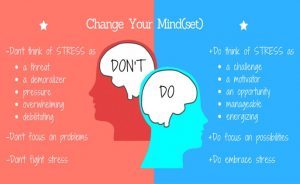Patient Information
Providing caring, compassionate and expert care to get you back to better health.
Address that Stress
Are you stressed? Have you felt overwhelmed, under pressure, or perhaps you just can’t cope? You’re not alone. According to an ABS National Survey of Mental Health and Wellbeing, one in eight Australians is currently experiencing high or very high psychological distress, which has been associated with major mental and physical health issues.1 Stress is believed to trigger 85% of serious illnesses and 70% of visits to doctors.
What is Stress?2
Firstly, let’s debunk one myth: stress is not necessarily a ‘bad’ thing. Without this brilliant ability to feel stress, humankind wouldn’t have survived. Our cavemen ancestors, for example, used the onset of stress to alert them to a potential danger, such as a sabre-toothed tiger. A stressful situation sets off a chain of events. Your body releases adrenaline, a hormone that temporarily causes your breathing and heart rate to speed up and your blood pressure to rise. These reactions prepare you to deal with the situation – the ‘fight or flight’ response. Once the threat or difficulty passes, these physical effects usually fade. We may not be chased around by wild animals these days, but we do encounter stress on a daily basis. You may be feeling anxious and panicked and it’s normal to feel like that sometimes. But if you are feeling like this more and more over time and you are struggling to cope, it’s time to make some changes. When demands exceed a person’s ability to cope, problems can arise as cognitive, emotional, physical or behavioural changes. Some people may choose to drink too much alcohol or smoke cigarettes to ‘manage’ their stress – however, these habits only increase blood pressure and your risk of a heart attack or stroke.
Stress may be related to:
- Work – unemployment, retirement, the high pressure deadline-driven working week, which is thought to cost billions each year in terms of absences from work.
- Family – divorce, relationship difficulties or being a carer
- Housing – moving house or problems with neighbours
- Life events – coping with a serious illness, bereavement or financial problems
- Technological – constantly being connected to devices 24/7, unable to switch off.
- Internal conflict and disconnect – feelings of ‘I should’, I must’ and ‘I need to.’
Staying Calm during Stress
Empower yourself by taking actions to control your stress level. The first step in dealing with stress is to become more aware of any stress related symptoms as early as possible. By understanding the causes and effects of stress in ourselves, we are also in a better position to recognise it in others and offer support when needed with stress management.
Could Stress be your Friend?
It has been proven that some stress can be good for you. It can help you accomplish tasks more effectively and actually improve performance. Growing research on stress mind-sets noted that the human stress response can put the brain and body in an optimal position to perform.3 While stretching beyond familiar limits doesn’t always feel good – to achieve and grow, we have to get outside our comfort zones and approach challenges. People who overcome difficult life circumstances often build emotional strength and go on to enjoy higher-than-average levels of resilience.
Across multiple studies, people with a positive stress mindsets – viewing stress as a challenge to be embraced – experienced fewer negative health symptoms, greater work performance and a greater quality of life.3 This mindset can actually shift your stress physiology toward a state that makes such a positive outcome more likely, for example by increasing your growth index and reducing harmful side effects of stress such as inflammation. In her TED talk, How to make Stress Your Friend, Health Psychologist Kelly McGonigal quotes a study that tracked 30,000 adults in the United States over eight years. It found that critically it wasn’t the amount of stress people experienced, but rather what they thought about it that had the biggest effect on their health. It was concluded that people didn’t die prematurely from stress itself, but from believing that stress was bad for them. It was all about stress management and perception.4
Pressure itself is not necessarily bad – in fact, many people excel under pressure. If we associate positive meaning to our stress, then it can actually serve us well. We cannot control what happens to us, but we can control how we respond and the meaning we attach to situations, therefore how it affects us. The next time you are stressed, stop, take a deep breath and say to yourself ‘This is my body, rising to the challenge’.
How to tackle stress2
Stress management is all about taking charge: of your lifestyle, thoughts, emotions, and the way you deal with problems. No matter how stressful your life seems, there are steps you can take to relieve the pressure and regain control.
Tip 1: Try these 10 Simple Stress Busters
- Count to 10 before you speak or react.
- Take a few slow, deep breaths until you feel your body un-clench a bit.
- Go for a walk, especially outdoors if possible. It can help break the tension and give you a chance to think things through.
- Try a quick meditation or prayer to get some perspective.
- If it’s not urgent, sleep on it and respond tomorrow. This works especially well for stressful emails.
- Walk away from the situation for a while, and handle it later once things have calmed down.
- Break down big problems into smaller parts. Take one step at a time, instead of trying to tackle everything at once.
- Turn on some chill music or an inspirational podcast to help you deal with road rage.
- Take a break to pet the dog, hug a loved one or do something to help someone else.
- Work out or do something active. Exercise is a great antidote for stress.
Tip 2: Use these easy Time Management Techniques
If you never seem to have enough time, better time management may help you regain control of your days.Whether it’s in your job or your lifestyle as a whole, learning how to manage your time effectively can help you feel more relaxed, focused and in control. The aim of good time management is to achieve the lifestyle balance you want.
- Work out your goals: Work out who you want to be, your priorities in life, and what you want to achieve in your career or personal life. That is then the guiding principle for how you spend your time and how you manage it. Knowing your goals will help you plan better and focus on the things that will help you achieve those goals.
- Make a list: To-do lists are a good way to stay organised. Keep a single to-do list, to avoid losing track of multiple lists. Keeping a list will help you work out your priorities and timings. Make sure you keep your list somewhere accessible such as your phone.
- Focus on results: Good time management at work means doing high-quality work, not high quantity.
- Have a lunch break: As a general rule, taking at least 30 minutes away from your desk will help you to be more effective in the afternoon. Go for a walk outdoors or, better still, do some exercise. You’ll come back to your desk re-energised, with a new set of eyes and renewed focus.
- Prioritise important tasks: Tasks can be grouped into 4 categories: People who manage their time well concentrate on ‘not urgent but important’ activities. That way they lower the chances of activities ever becoming “urgent and important”.
- Practise the ‘4 Ds’: Making a decision the first time you open an email is crucial for good time management.
- Delete: you can probably delete half the emails you get immediately.
- Do: if the email is urgent or can be completed quickly.
- Delegate: if the email can be better dealt with by someone else.
- Defer: set aside time later to spend on emails that will take longer to deal with.
Tip 3: Breathe
Have you ever let out a sigh of relief and felt all the stress and tension just melt away? Our breathing is something we can control and a powerful way to influence our body. Check out these calming breathing exercises from Beyond Blue: https://www.beyondblue.org.au/get-support/staying-well/relaxation-exercises
Tip 4: Move More
Gentle movement such as yoga and tai chi all the way up to more vigorous movements, such as cycling, or even just a walk at lunch times, will help release those feel-good endorphins, which counter stress and can increase productivity, focus and concentration.
Tip 5: Nourishing Food
Our diet is incredibly important to stress management and our overall health and wellbeing. Try to remove toxins from your diet such as nicotine, alcohol, caffeine and refined sugar that stress the body.
Tip 6: Meditation
Guided meditations, self-hypnosis and relaxation audios/apps have been proven to be incredibly effective in stress management and relaxing the body and mind.
Tip 7: Make more ‘Me Time’
Doing things we love not only releases happy hormones to make us feel good, but it makes us healthier too. Relaxing activities activate the parasympathetic nervous system which produces a calm and relaxed feeling in the mind and body. Activities like getting a massage or pampering yourself is not just a luxury, self care should be part of your health care routine as it reduces stress.
Tip 8: Laugh it up
Enjoy ‘stress management’ with a favourite hobby or watching a funny movie. Laughter is important as it releases endorphins and decreases the stress hormones in the bloodstream.
Tip 9: Sleep
Try to get six to eight hours of sleep each night to fight insomnia. A good night’s sleep allows you to tackle the day’s stress easier
Tip 10: Positive Self-Talk
Negative self-talk increases stress. Positive self-talk can help you calm down and control stress. With practice, you can learn to shift negative thoughts to positive ones. For example: “I feel helpless and alone.”> “I can reach out and get help if I need it.”
Tip 11: Connect with People
A good support network can ease your troubles and help you see things in a different way. Oxytocin, a chemical that has anti-stress benefits such as lowering blood pressure and is a natural anti-inflammatory, increases when we hug, touch or are physically close to someone. So when you reach out to others under stress, either to seek support or to help someone else, you release more of this hormone, your stress response becomes healthier, and you actually recover faster from stress.
Tip 12: Professional Therapy
It’s important not to suppress your feelings, but to listen and act on them. What needs to change? What result would you want instead? Sometimes the best way to do this is to talk to others and benefit from their valuable experience, or gain expert’s opinions and advice. It is an act of self-care to seek professional help and know that you deserve to get better.
Content Sources:
- Australian Bureau of Statistics. (2018). National Health Survey: First Results 2017-18. Canberra: ABS.
- Stress Management Society from distress to de-stress. Retrieved from: https://www.stress.org.uk/what-is-stress.
- Crum A. J., Salovey P. and Achor S. (2013). Rethinking stress: The role of mindsets in determining the stress response. Journal of Personality and Social Psychology, 104(4), 716-733.
- Damour L. (2018). How to Help Teenagers Embrace Stress. Retrieved from: https://www.nytimes.com/2018/09/19/well/family/how-to-help-teenagers-embrace-stress.html.

